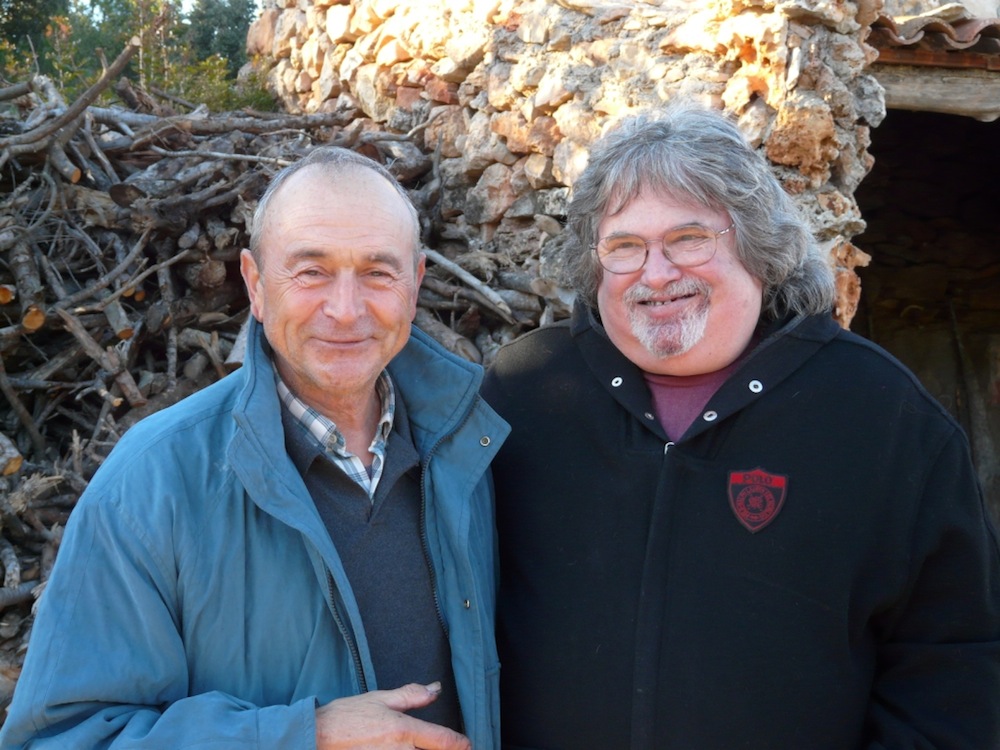Wine Advocate, nº 194, May 2011
Celler de Capcanes is one of the leading estates of Montsant and arguably one of the great producers of Kosher wine this side of Manischewitz. This unusual story began in 1995 when the Jewish community of Barcelona asked Capcanes if they could produce a Kosher wine. The installation of new equipment allowed for the production of Kosher wine but also high quality wines from the old vine Garnacha and Carinena grown in the local villages by the 80 members of the cooperative. While the Kosher wines put Capcanes on the map, it represents only 2% of the production and now it is the other 98% which drives the business. The following wines were tasted during my visit to Celler de Capcanes in January, 2011.
PERAJ HA´ABIB/ FLOR DE PRIMAVERA 2009 : The 2009 Peraj Ha-abib/Flor de Primavera (Kosher) is made up of equal parts Garnacha, Carinena, and Cabernet Sauvignon aged for 13 months in a mix of new and used French oak. It is a dense, loaded offering with mouth-filling red and black fruits, liquid minerality, and floral notes. Powerful, impeccably balanced, and lengthy, it will evolve for 4-5 years and drink well through 2024. Rating: 95 points; Drink 2011-2024 ; Est. cost: $45; WA, nº 194, May 2011
FLOR DE FLOR DE PRIMAVERA 2007: The 2007 Flor de Flor de Primavera (Kosher) is 100% Garnacha sourced from 85- to 105-year-old vines and aged for 18 months in new and 1 year French oak. It sports an expressive perfume of minerals, exotic spices, incense, black cherry, and lavender. It deftly combines elegance with power on the palate along with outstanding grip and balance. Give it another 3-4 years of cellaring and drink it from 2014 to 2022.
Rating: 94 points; Drink 2014-2022 ; Est. cost: $65; WA, nº 194, May 2011
PANSAL DEL CALAS 1996: A taste of the 1996 Pansal del Calas (the first vintage of this cuvee) reveals that the wine is capable of evolving in the style of a quality Port. It exhibits an aged character in both its appearance and flavor profile. The wine is lengthy, complex, and a fine way to end a meal. Rating: 94 points; Drink – ; Est. cost: – ; WA, nº 194, May 2011
PANSAL DEL CALAS 2008: Celler Capcanes produces a fortified wine called Pansal del Calas. The 2008 Pansal del Calas is a blend of 70% Garnacha and 30% Carinena aged for 18 months in a mix of new and used French oak. The wine is fermented to 12% alcohol and fortified to 16 %. It is a medium-sweet, dense elixir with a powerful, Port-like character. Rating: 92 points; Drink – ; Est. cost: $35; WA, nº 194, May 2011
CABRIDA 2009: The 2009 Cabrida is 100% Garnacha sourced from 85- to 105-year-old vines and aged for 14 months in a mix of new and used French barrels of various sizes. It sports an alluring bouquet of exotic spices, mineral, lavender, incense, and black cherry. In the glass it is dense and mouth-filling with succulent black cherry and spicy flavors and 6-8 years of aging potential. It will be at its best from 2015 to 2024. Rating: 92+ points; Drink 2015-2024; Est. cost: $65; WA, nº 194, May 2011
COSTERS DEL GRAVET 2009: The 2009 Costers del Gravet is made up of 60% Cabernet Sauvignon, 30% Garnacha, and 10% Carinena aged for 12 months in new and used French oak. Opaque purple in color, it gives up an inviting nose of wood smoke, mineral, exotic spices, black currant, and plum. In the glass the wine's density and structure are revealed along with loads of chewy, spicy black fruits, plenty of volume, impeccable balance, and a fruit-filled finish, quite an achievement for a $20 wine. Rating: 91+ points; Drink ; Est. cost: $20; WA, nº 194, May 2011
VALL DEL CALAS 2009: The 2009 Vall del Calas is composed of 70% Merlot, 25% Garnacha, and 5% Tempranillo aged for 11 months in a mix of new and used French oak. It sports an already complex bouquet of smoke, spices, incense, and assorted black fruits. This is followed by a layered, succulent wine with loads of spicy fruit, a firm structure, and a lengthy, pure finish. It is likely to evolve for 1-2 years and will drink well through 2021. Rating: 90 points; Drink 2011-21; Est. cost: $20; WA, nº 194, May 2011
MAS DONIS BARRICA 2009: The red wines begin with the 2009 Mas Donis Barrica, a blend of 80% Garnacha and 20% Syrah aged for 9 months in French and American oak. It gives up a fragrant nose of mineral, spice box, black cherry, and black raspberry. In the glass it reveals a bit of structure, ripe, spicy black fruits, and excellent length. It is an outstanding value for drinking over the next 4-5 years. Rating: 89 points; Drink 2011-2016; Est. cost: $13; WA, nº 194, May 2011
MAS DONIS ROSAT 2010: The 2010 Mas Donis Rosat is 80% Garnacha with the balance Syrah and Merlot made by the saignee method. Cherry pink in color, it sports inviting aromas and flavors of strawberry and raspberry leading to a dry, lively, savory Rose for drinking over the next 12-18 months. It is an excellent value! Rating: 88 points; Drink 2011-2012; Est. cost: $10; WA, nº 194, May 2011


